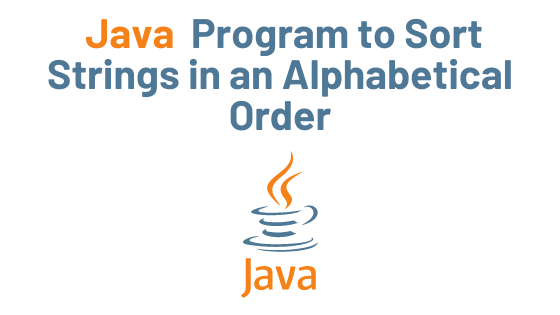In this Java tutorial, we’ll look at how to sort Strings alphabetically.
In this program, we ask the user to enter the number of strings that he wants to sort. After capturing the count with the Scanner class, we’ve initialized a String array of the input count size and are running a for loop to capture all of the strings entered by the user.
Once we’ve stored all of the strings in the string array, we’ll compare the first alphabet of each string to sort them alphabetically.
duplicate Characters duplicate Characters duplicate Characters duplicate Characters vduplicate Characters duplicate Characters
public class JavaExample
{
public static void main(String[] args)
{
int count;
String temp;
Scanner scan = new Scanner(System.in);
//User will be asked to enter the count of strings
System.out.print("Enter number of strings you would like to enter:");
count = scan.nextInt();
String str[] = new String[count];
Scanner scan2 = new Scanner(System.in);
//User is entering the strings and they are stored in an array
System.out.println("Enter the Strings one by one:");
for(int i = 0; i < count; i++)
{
str[i] = scan2.nextLine();
}
scan.close();
scan2.close();
//Sorting the strings
for (int i = 0; i < count; i++)
{
for (int j = i + 1; j < count; j++) {
if (str[i].compareTo(str[j])>0)
{
temp = str[i];
str[i] = str[j];
str[j] = temp;
}
}
}
//Displaying the strings after sorting them based on alphabetical order
System.out.print("Strings in Sorted Order:");
for (int i = 0; i <= count - 1; i++)
{
System.out.print(str[i] + ", ");
}
}
}
Output:
sort Strings alphabetically sort Strings alphabetically sort Strings alphabetically sort Strings alphabetically sort Strings alphabetically sort Strings alphabetically sort Strings alphabetically sort Strings alphabetically
| Enter number of strings you would like to enter: Enter the Strings one by one: Sagar tahil Sumit Avdhesh Hitesh Strings in Sorted Order: Avdhesh, Hitesh, Sagar, Sumit, tahil |
Annotations in Java are used to provide metadata for your Java code. Because they are metadata, Java annotations do not directly affect the execution of your code, though some types of annotations can. Java annotations were introduced in Java 5 and are still in use today. Annotations in Java are used to provide metadata for your Java code. Because they are metadata, Java annotations do not directly affect the execution of your code, though some types of annotations can. Java annotations were introduced in Java 5 and are still in use today. Annotations in Java are used to provide metadata for your Java code. Because they are metadata, Java annotations do not directly affect the execution of your code, though some types of annotations can. Java annotations were introduced in Java 5 and are still in use today. Annotations in Java are used to provide metadata for your Java code. Because they are metadata, Java annotations do not directly affect the execution of your code, though some types of annotations can. Java annotations were introduced in Java 5 and are still in use today. Annotations in Java are used to provide metadata for your Java code. Because they are metadata, Java annotations do not directly affect the execution of your code, though some types of annotations can. Java annotations were introduced in Java 5 and are still in use today. Annotations in Java are used to provide metadata for your Java code. Because they are metadata, Java annotations do not directly affect the execution of your code, though some types of annotations can. Java annotations were introduced in Java 5 and are still in use today. Annotations in Java are used to provide metadata for your Java code. Because they are metadata, Java annotations do not directly affect the execution of your code, though some types of annotations can. Java annotations were introduced in Java 5 and are still in use today. Annotations in Java are used to provide metadata for your Java code. Because they are metadata, Java annotations do not directly affect the execution of your code, though some types of annotations can. Java annotations were introduced in Java 5 and are still in use today. Annotations in Java are used to provide metadata for your Java code. Because they are metadata, Java annotations do not directly affect the execution of your code, though some types of annotations can. Java annotations were introduced in Java 5 and are still in use today. Annotations in Java are used to provide metadata for your Java code. Because they are metadata, Java annotations do not directly affect the execution of your code, though some types of annotations can. Java annotations were introduced in Java 5 and are still in use today.
nbnJava Program to find duplicate Characters in a String with Example
convert char to String and String to char convert char to String and String to char convert char to String and String to char convert char to String and String to char convert char to String and String to char v convert char to String and String to char convert char to String and String to char Annotations in Java are used to provide metadata for your Java code. Because they are metadata, Java annotations do not directly affect the execution of your code, though some types of annotations can. Java annotations were introduced in Java 5 and are still in use today. Annotations in Java are used to provide metadata for your Java code. Because they are metadata, Java annotations do not directly affect the execution of your code, though some types of annotations can. Java annotations were introduced in Java 5 and are still in use today. Annotations in Java are used to provide metadata for your Java code. Because they are metadata, Java annotations do not directly affect the execution of your code, though some types of annotations can. Java annotations were introduced in Java 5 and are still in use today. Annotations in Java are used to provide metadata for your Java code. Because they are metadata, Java annotations do not directly affect the execution of your code, though some types of annotations can. Java annotations were introduced in Java 5 and are still in use today. Annotations in Java are used to provide metadata for your Java code. Because they are metadata, Java annotations do not directly affect the execution of your code, though some types of annotations can. Java annotations were introduced in Java 5 and are still in use today. Annotations in Java are used to provide metadata for your Java code. Because they are metadata, Java annotations do not directly affect the execution of your code, though some types of annotations can. Java annotations were introduced in Java 5 and are still in use today. Annotations in Java are used to provide metadata for your Java code. Because they are metadata, Java annotations do not directly affect the execution of your code, though some types of annotations can. Java annotations were introduced in Java 5 and are still in use today. Annotations in Java are used to provide metadata for your Java code. Because they are metadata, Java annotations do not directly affect the execution of your code, though some types of annotations can. Java annotations were introduced in Java 5 and are still in use today. Annotations in Java are used to provide metadata for your Java code. Because they are metadata, Java annotations do not directly affect the execution of your code, though some types of annotations can. Java annotations were introduced in Java 5 and are still in use today. Annotations in Java are used to provide metadata for your Java code. Because they are metadata, Java annotations do not directly affect the execution of your code, though some types of annotations can. Java annotations were introduced in Java 5 and are still in use today.



